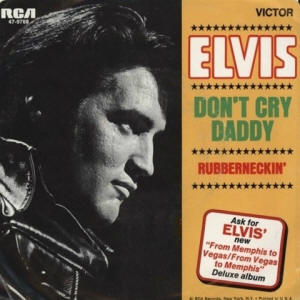Verdict
With a funny, uptempo tune and an emotional ballad Elvis displayed two very different sides of himself and did it with bravura.
![]()
(C) RCA Victor
The ultimate site about the king of the analogue age


On November 11, 1969 RCA Victor released "Rubberneckin'" / "Don't Cry Daddy". Everybody considered "Don't Cry Daddy" to be the a-side, on November 29th the song entered Billboard's "Hot 100" at number 73, had a run of 13 weeks and peaked at number 6. On December 6th it also entered the "Easy Listening Chart". Here it was listed 11 times and reached number 3. On December 20th "Don't Cry Daddy" made it on the "Hot Country Singles Chart", too. The ballad had a run of 12 weeks and peaked at number 13. In January 1970 the RIAA presented a Gold Award to Elvis, in 1992 the organization updated the status to Platinum. Outside of the US the single was very successful, too. Worldwide the 45 sold three million times, which can be translated to 450 million paid streams.
The single cannot be found on the streaming platforms. "Rubberneckin'" is part of the album "Almost In Love" (1970), "Don't Cry Daddy" has been added as a bonus track to the digital version of "From Elvis In Memphis" (1969). In 2016 the complete Presley catalogue was restored and remastered by Vic Anesini for a boxed set of 60 compact discs called "The Album Collection". Sony Music Entertainment provides the streaming platforms with the same versions of the individual tracks, albeit in 24 bit/90 khz flac. That means, if the platform of your choice supports high resolution audio, you can enjoy the songs in the same quality Sony used to scan and master them. On Spotify, which has a market share of approximately 30% and is the only platform that publishes streaming figures, "Rubberneckin'" accumulates 19 million streams, "Don't Cry Daddy" clocks in at 22 million. So one might say, that over the decades "Rubberneckin'" has caught up quite a bit.
The cover was designed with a photo taken during the live segments of the tv special "SINGER presents Elvis" (1968). Of course the sleeve also advertised the current movie "Change Of Habit" (which included a performance of "Rubberneckin'") and the latest album of the king (the double-lp "From Memphis To Vegas/From Vegas To Memphis").
Rubberneckin'
The song was written by Bunny Warren, a nom de plume of Ben Weisman. Elvis recorded "Rubberneckin'" within two takes on January 20, 1969 at American Sound Studio in Memphis/Tennessee. Between January 22nd and 24th Chips Moman added harmony vocals, on March 19th horns were recorded. Even though it wasn't intended to be a movie song, somehow it ended up in Universal's "Change Of Habit". In 1970 CAMDEN released the track on their budget album "Almost In Love". 33 years later a re-mix by Paul Oakenfold became a top 10 hit in Australia and several European countries.
Don't Cry DaddyThis track was also recorded at American Sound Studio in Memphis/Tennessee. On January 15, 1969 the band put a rhythm track on tape, Elvis added his vocals on January 21st. On March 19th producer Chips Moman added brass, on March 21st strings were overdubbed. "Don't Cry Daddy" was written by Mac Davis, who also provided "In The Ghetto". In the song an unnamed child asks the singer not to grief anymore for the loss of his wife and even promises to find a new mommy for him and his brother. Even though the lyrics are very sentimental, "Don't Cry Daddy" never crosses the boarder to the kitschy side. Later RCA Victor also released the song on the boxed set "Worldwide 50 Gold Award Hits - Volume 1" (1970).
With a funny, uptempo tune and an emotional ballad Elvis displayed two very different sides of himself and did it with bravura.
![]()
(C) RCA Victor